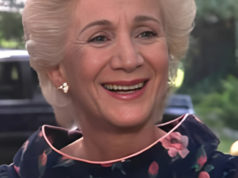The competition’s second day brought our first performances of Mozart, Scriabin, Schubert, and John Adams. I missed the Champions League final on TV and Taylor Swift at Cowboys Stadium today, but I wouldn’t want to be any other place.
Like a true artist, Oleksandr Poliykov wears his hair with a few strands dangling down over his forehead. Unusually, he opened with a showpiece, Liszt’s Ninth Hungarian Rhapsody. I like this move; with the competition format not allowing for encores, why not move the thing to the beginning of the recital instead of saving it for the end? His Liszt was in fine fettle, too (despite a few wrong notes), but he squandered that with his version of Mussorgsky’s Pictures at an Exhibition. Some of the individual items in the suite were persuasive, like the slow boil he brought to “Samuel Goldenberg and Shmuel,” but he dawdled self-importantly for pretty effects in too many places, even in “Baba Yaga,” of all places. Must have been tempting for a pianist from Kiev to play “The Great Gate of Kiev,” but he didn’t do anything special with that work.
Some fun facts about the surname “Lin”: It’s either the 16th- or 19th-most common Chinese surname, depending on which survey you consult. The Chinese government estimates 12.5 million Lins living in China. For comparison, Smith is the most common surname in English, and there are only 3 million Smiths in America and Britain combined. The English-speaking world is far more diverse with its surnames, but you can see just how many Lins there are in the world. There’s a particularly heavy concentration of them in Taiwan, where my father is from, and also where Lin Kuan-Ting is from. The pianist was the very definition of uneven. I liked his vocal line and accompaniment in Liszt’s transcription of “Gretchen am Spinnrade,” and he brought plenty of rage to “Orage” (“Storm”) from Liszt’s Années de pèlerinage. However, I found him getting lost in uncommunicative reverie in both “Au bord d’une source” and “Vallée d’Obermann” from the same Liszt suite, and he tried to play Haydn’s Sonata in E-flat major (Hob. XVI: 52) like it was late Beethoven. Not a good move. His other program would seem to play more to his strengths, though.
Nikita Abrosimov played Mozart and Brahms. On one hand, you can fairly say he’s not wedded to preconceptions about how to play these composers. On the other hand, you can fairly say he’s wedded to Russian romantic readings of everybody, as he often made Brahms’ First Piano Sonata sound like Rachmaninov. His approach probably would have been more suited to Chopin, but I still say it worked. He played that sonata with great rhythmic verve and a brashness that’s not out of line for early Brahms. He also made no attempt to replicate the old pianoforte sound for Mozart’s Fantasia. This piece is fundamentally unlike Mozart’s sonatas, and Abrosimov made it sound fresh and forward-looking.
Some joker about eight seats down in my otherwise empty row fell asleep during Tomoki Sakata’s performance and was audibly snoring. I was actually glad when that guy’s cell phone went off, because it woke him up. He slept through the best performance I’ve heard so far. The competition’s only Japanese pianist came on wearing a blue shirt, which was nice to see amid all these guys wearing black-on-black or tuxes. (The female contestants are allowed to wear colorful dresses, but there are only five women competing this year. That’s a whole other conversation.) Sakata played Beethoven’s Sonata in F major, the one that comes smack between the Waldstein and the Appassionata, and turned in an assured and lucid reading. That was only an appetizer for Liszt’s Dante Sonata. Even though the piece is entirely too long, it still showcased Sakata’s great sense of dramatic timing and plush tone, which stayed beautiful amid the general welter of sound that the sonata required. The same was true for his slightly unhinged take on “La Campanella.” The real glory was his gorgeous, convulsive reading of Scriabin’s Fifth Sonata. My mouth was actually hanging open during this performance. Not every pianist can get on Scriabin’s ecstatic wavelength, but Sakata did. And he’s only a teenager. Scary!
Someone else described Lindsay Garritson as a “muscular” pianist when she played here at the screening recitals. That person must have been staring at her arms. This girl’s got serious biceps. I think she could put me down in an arm-wrestling contest, along with all the other music critics working alongside me. And Taylor Swift, too. She certainly plays with power, but she performed Schubert’s Klavierstück in E-flat major just as a change of pace. The piece is too monotonous, but it accomplished its purpose in showing that Garritson can bring subtlety and lyricism as well as power. Just as she did last February, she played Prokofiev’s Seventh Sonata, but this time I understood better what she was trying to do. Where most pianists play this piece as an all-destroying death machine, she emphasized the softer, more lyrical parts. Her perspective was fascinating and unique, but I still prefer the all-destroying death machine. My favorite piece was her Liszt B minor Ballade, which was stronger and more focused than Greco’s, and better than when she played it last February. Whether she’s playing runs of notes or octaves, her left hand is superb. Want to hear more.
Another pianist from Kiev, Vadym Kholodenko sorta looks like Matthew Lewis, the actor who played Neville Longbottom in the Harry Potter series. Not a bad person to resemble! The Ukrainian chose two esoteric pieces. If contests like these are frequently about comparing apples to oranges, this guy brought an African horned melon. He played John Adams’ China Gates, a piano piece by a composer better known for his orchestral works and operas. It’s a calm piece played mostly in the instrument’s upper register, except for an occasional bass note. Kholodenko did fine with it. He was better in Rachmaninov’s First Piano Sonata, a seldom-performed piece that my colleagues in the pressroom roundly panned. True, the piece would have been much better had it ended five or ten minutes earlier. (In the context of a piano piece, ten minutes is a long, long time.) Still, Kholodenko took to the idiom easily.
It’s amusing to think that Alessandro Taverna can walk outside Bass Hall, look down 4th Street, and see a restaurant that bears his name. If he can see past all the construction that’s still going on in downtown Fort Worth, that is. The crowd buzzed during Taverna’s performance of Busoni’s Turandots Frauengemach, from the composer’s Turandot. (You didn’t know Busoni wrote his own opera version of that story around the same time as Puccini, did you? You do now.) The piece quotes “Greensleeves,” which Busoni used as background music in his opera. Other than that, I found Taverna’s recital alarming, because I listened to him for 45 minutes without getting the slightest idea of his musical identity. I hope he was boring, because the implications are too frightening for me if he wasn’t. Maybe his second recital will give me an idea of what he’s about.
Sporting an impressive head of curly hair, Russia’s Nikolay Khozyainov started brightly with the best Haydn performance I’ve heard so far, exhibiting clarity and point in the D Major Sonata (Hob. XVI: 33). He then trotted out three showpieces to display different facets of his technique: right-hand arpeggios (Chopin’s Étude in C major), quicksilver runs (Liszt’s Feux follets), and left-hand runs (Scriabin’s Étude in C-sharp minor, Op. 42, No. 5). They all came off reasonably well, especially the Scriabin. Yet the pianist fell at the final hurdle, Ravel’s Gaspard de la Nuit, a suite that requires not only loads of technique but a morbid turn on mind that the 20-year-old Russian simply doesn’t possess at this point. “Le gibet” was too clean and ploddingly paced, and all the pieces lacked any sense of danger. Too bad.
I liked Alessandro Deljavan when he played at the Cliburn in 2009. I’m not sure what happened in the last four years, but I thought he totally overplayed his recital tonight. His cheerful gusto seemed like a breath of fresh air in the Bach Fifth Partita until he launched into Chopin’s Op. 25 Études and it turned out that that’s pretty much all he does. Oh, he was able to drop it for the pathos-filled No. 7, and his more-is-more approach benefited the last three etudes in the set, which are pretty well impossible to play too fast or too loud. But everything else suffered, with sound continuing to gush from the piano when it would have been better for him to pull back. Literally, he needs to take his foot off the pedal.













It’s very effortless to find out any topic on net as compared to textbooks, as I found this paragraph at this site.